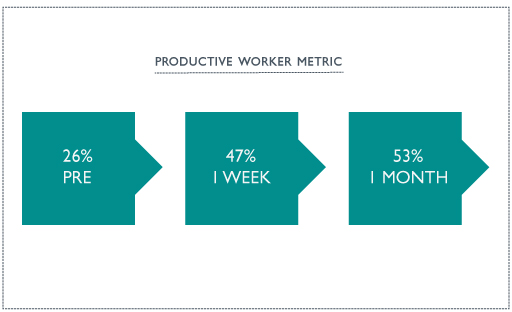Bristol City Council
Working Smarter
Participants double productivity
As with all councils, there is a constant demand to provide consistently high quality services at reasonable cost, at a time when resources are under pressure. Participants in our programme doubled their productivity and the number of effective people trebled.
A Working Smarter project
Bristol City Council is one of the largest employers in the city, employing over 7,000 members of staff.
The Programme
The emphasis of the Working Smarter programme was on creating time to work on what’s important, rather than working more.
The programme centred around an initial workshop delivered as a full day or two half days, supported by 1-2-1 mentoring.
We provided space, tools and support to help participants identify ways to increase their capacity and maintain control over their work.
What we did
The practical workshops allowed attendees to actively work through their current and future projects and tasks: planning and building a systematic workflow suited to their work style. Teams were able to explore ways to work more effectively together.
A month later, hour long one-to-one mentoring sessions supported participants in embedding practices that matched their work style and making the changes permanent. A different emphasis was placed according to role complexity, for example the focus was extended to help directors and their assistants to work with greater coordination and directors to work more effectively with their peers and direct reports.
The programme identified unhelpful patterns and introduced practical tools to help shift behaviours, support improved email handling, task planning and project management.
The Results
 The Working Smarter programme doubled productivity among participants and trebled the number of effective people.
The Working Smarter programme doubled productivity among participants and trebled the number of effective people.
The number of those rating themselves excellent at email management increased from 14% to 71%.
The number of people highly engaged in their work increased by 50%.
 At the start of the programme 77% of participants were categorised as partially or unproductive, by the end of the programme this reduced to 15%.
At the start of the programme 77% of participants were categorised as partially or unproductive, by the end of the programme this reduced to 15%.
By the end of the programme the number of wholly effective people had increased from 4% to 26% and the number of effective people had trebled from 19% to 59%.
The Impact
The impact of the programme was monitored through a self assessment survey covering a number of dimensions before, during and after the programme.
Scores doubled over the course of the programme.
A particularly satisfying outcome was the increase in engagement. As people discovered increased agency in the management of their work they found themselves able to deliver more effectively, increasing their satisfaction.
The programme established the basis for a cultural shift in personal organisation and task management across the organisation.
Improvements have proved enduring.


